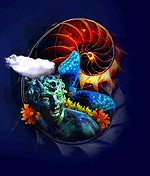|
|
Oswald LeWinter
Ages of Chaos and Fury
Ravenna Press
ISBN Number: 0976659387
and Atoms of Memory
Semit Verlag
ISBN Number: 3937389504
Reviewer: Rachel Dacus
LeWinter has a book out this year and one published last year—his first poetry collections in more than forty years. What is one to make of such a silence? It is as much a paradox as the poet himself, a man who has improbably combined the vocations of poet, soldier, and spy. Once hailed by such luminaries as T.S. Eliot and William Carlos Williams as a rising young star, LeWinter is now a living figure of Modernist history. In his seventies, LeWinter still strives to fulfill that vaunted promise, and it is that sense of striving that makes the work interesting. In an unusual way, these are young poems trapped in an older man’s history.
LeWinter started publishing again about ten years ago, from Europe, where he now resides after having left America for good. His politics seem to be complicated, and it would be tempting to review the complications behind the poetry rather than the poetry itself. Suffice it to say that after a career in the U.S. military and military intelligence that encompassed Vietnam and Iran-Contra, LeWinter retired from politics.
The poems in these books minimize that colorful background. It would be hard to deduce LeWinter’s exact involvement in global conflicts by reading the war poems. Instead, the war poems speak in a present tense of grimness and futility. The poems in these books almost all bear scars of loss, regret, and bitterness, but they have an underlying aspiration toward beauty and innocence that is deeply affecting.
LeWinter’s poems of childhood are most touching in this regard, especially the ones in Atoms of Memory. “Immigrant Childhood" and “American Requiem" speak in a kind of classical free verse—simple syntax, spare imagery, and straightforward confession. Their combination of love and sadness reminds me of Stanley Kunitz’s poems about childhood, a lyrical longing both poets share, as in these stanzas from “American Requiem":
The streets lie unwashed and rich
In garbage; feverish tar, soft under foot,
In glistening furrows, as if a thousand shards
Lay planted in its mass. The wind
Is cooling the green suburbs.
Young and old clot the doorways
And, after dark ooze onto corners
Toward a dance of neon signs.
The mob suffers from its size.
For the despised, history is no flight
Of anecdotes returning like plump geese
From pleasant winters
To the graciousness of spring in Doric fields.
Here there is only the present,
Pale as a TV screen fading off
To gray snow, leaving the cat,
Tissue thin, to prowl from hall to hall.
But LeWinter’s poetry has not yet found the philosophical detachment of old age that Kunitz attained. LeWinter’s poems reach hungrily for peace beyond the anguish which forms their tonal base. This is poetry from a wounded heart, forever in flight from the terrors of our times. A deep restlessness underlies his work and his life as an exile, noted in a Lord Byron quote LeWinter uses as the epigraph in Ages of Chaos and Fury: “An exile, saddest of all prisoners, who has the whole world for a dungeon."
It is tempting to construe a permanent inability to find peace from the story of a boy transplanted from his native Europe to a harsh American city. Yet I sense in the poems themselves a prediction of an upward path. Among many poems in which war makes an appearance are those that speak of the poet’s cultural and familial origins. “Kafka in Quogue" entwines family details with the European literary legacy via a picture of Kafka that frowns on a family birthday celebration. The lore of despair is conveyed through the blowing up of balloons:
We laugh as first a red
and then a grape balloon breaks
from an excess of breath
and say, “It’s nothing," as I lift
the next, green with yellow stars,
to my dry and puckered lips.
But Kafka’s gaze conveys
the bittersweet futility of joy, of life
as a balloon that won’t inflate,
wrinkled and stuck together,
an old breast that bears the traces
and shape of lost purpose.
His mouth, a first, affirms
talmudic wisdom I have heard
mumbled under humble prayer-shawls
by lips, curved like Cossack sabers,
that memorized legends of pain
to warn a child untried by time.
“Cossacks," another eloquent memoir poem from Atoms of Memory, tells the story of the father who chopped off his own trigger finger to avoid being conscripted by Cossacks—a fate the son did not quite escape.
Here lies the man, expensively,
In one of his ten Sabbath suits,
His right hand holding down
His talked-out heart as in some final oath,
The four remaining digits
So fleshed with the gold moments
Of the gold country he espoused
The severed one is not missed, seems
Merely to be bent at the healed knuckle
Pointing inward at the heart
Long since delivered from its error.
Such unequivocal tenderness amidst poems of despair like “A Nun in Kosovo" and “Looking Up At Hell" is a marvel. I read through these books sensing the transformation to come, understanding the catalogue of war horrors as an enumeration of what must be ultimately overcome. In Ages of Chaos and Fury, “Words for a Borodin Cello Sonata" celebrates the poet’s pending self-resurrection through his art:
Secretive pizzicato! Harps arrayed in the depths
announce the end of winter, and the resurrection
of the dead son who followed the seductive moon
into the arms of the dark lake one midsummer night.
The snow must melt and hills come to life again
covered with spring, while hopes fill your soul.
Then watch the steaming lake release the moon
at every buoyant dawn as longing drowns.
Do you not feel the angel press notes on the strings,
and stroke the bow with his inspired wings?
Perhaps the poetry of maturity is made in the spring that emerges from a long winter—from an imagination nurtured and deepened by long silence. In LeWinter’s case, a long absence from writing and from the literary scene certainly seems to have energized and enriched his later singing.
|
|



